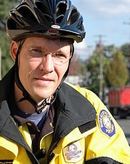
(Photo © J. Maus)
Robert Pickett is a member of the Portland Bicycle Advisory Committee, an Alice Award nominee, a regular commenter and contributor to the Forums here on BikePortland.org, and he’s also a Portland Police Officer.
Formerly a member of the Southeast Bike Patrol Unit, he now coordinates that unit along with being a Neighborhood Response Team officer.
Officer Pickett was recently recognized by the Police Bureau for his community policing efforts.
He previously wrote an article explaining why cops ride on sidewalks.
Catching Bees with Humility
A few Monday mornings ago I was at the entrance to the Springwater Corridor at SE 4th and Ivon taking pictures for a proposal I was drafting for PDOT. I’m hoping that removing some non-intuitive stop signs, adding some striping, and making a couple of other little additions might improve bicycle traffic flow between the Corridor and the East Bank Esplanade.
“Are most of us spreading the bicycle message respectfully, or are we making angry demands? Which strategy will best advance the biking cause?”
It was 11am, and chilly. Virtually no motor vehicles or bicycles. No parking either, so I left my car in the middle of the block on 4th Ave. with the hazards on, mostly in the motor vehicle lane, a little in the bicycle lane, thinking that there was still plenty of room for the few cars and bikes to get by for a few minutes. (See Photo)
A solitary man on a bicycle approached swiftly from the north. Mid-thirties, fit, maybe twelve miles per hour.
“Is that your car in the bike lane back there?” he asked as he came close.
“Yeah,” I said innocently, lowering the camera.
“MOVE IT!”
Shock, for a brief moment. Then anger. A vulgar, two word reply quickly came to my mind, but I managed to contain it. The man disappeared toward Sellwood.
He left me seething.

But why so mad? I asked myself after a couple of calming seconds. I realized my rage was partially shame for being caught doing something I probably shouldn’t have. And mostly outrage at the dismissive rudeness of the man. He made no attempt to engage or understand or persuade, just a shouted command followed by a quick getaway.
I realized that in most settings we’d probably find ourselves teammates on the bicycle advocacy squad. But for a few moments, with two shouted words, he’d persuaded me to hate all bikers. Yes, it’s silly and unreasonable to judge a group by the actions of an individual. I know. But I was thinking it. I felt too angry and disrespected to be reasonable.
I quickly recovered, of course. But I worry a different road user, one less bicycle-oriented, might have been made a permanent enemy. How many potential allies are alienated with every yelled epithet or wave of the middle finger?
It made me wonder. Are most of us spreading the bicycle message respectfully, or are we making angry demands? Which strategy will best advance the biking cause?
I’m called to help mediate disputes all the time for my job. I’ve noticed that many people take strongest offense at a disrespectful or dismissive tone, to the extent that it can often overshadow the actual origin of the disagreement. And when the situation disintegrates to the point where someone calls the police, there has usually been enough perceived disrespect that traction toward solutions is virtually impossible, even with the fairest and most reasonable of strategies.
I have met neighbors who have lived angry at each other for years, all stemming from the simplest of perceived slights, like someone parking in front of someone else’s house, but aggravated by derisive communication.
Such anger seems a monumental waste of energy, when a softer approach, which might take a little more time and patience up front, could potentially prove more effective and efficient.
Had Angry Biker Man stopped to say, in a respectful tone, “Hey listen, I’m just a little concerned about your car edging into the bike lane back there and here’s why…,” most Portlanders, the vast majority of whom are quite reasonable, would have said, “sorry about that,” moved the car, and then probably thought twice next time.
Yes there are unreasonable people out there for whom this strategy will not work, and I’m not suggesting that patently reckless, dangerous behavior is acceptable from anyone, but I wonder if there is room to be patient about some auto-driver and bicycle-rider errors. I wonder if it is reasonable to give up a few inches of bike lane if it is safe to do so and it appears temporary.
If the answer is no, I wonder if a considerate request would tame more bees than a shouted demand.

